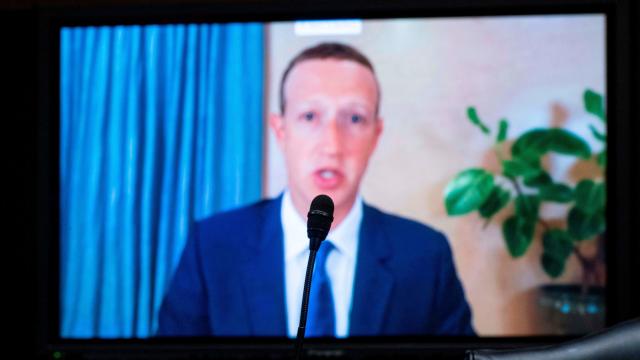Facebook has handed the keys locking Donald Trump off its platforms over to its Oversight Board, which will decide whether the former president can once again spew his thoughts on a major social network.
The question of whether to restore Trump’s access to Facebook and Instagram, which the company blocked the day after Trump helped incite a deadly insurrection at the U.S. Capitol on January 6, has amplified a bitter debate over the power of major technology platforms in American life. In passing the buck to its Oversight Board — which is “independent” to the extent that a body formed and funded by Facebook can be — the company hopes to deescalate the notion that CEO Mark Zuckerberg and other Facebook executives can alone decide the nature of free speech on its platforms.
[referenced id=”1662580″ url=”https://gizmodo.com.au/2021/01/facebook-blocks-trump-indefinitely/” thumb=”https://gizmodo.com.au/wp-content/uploads/2021/01/08/pj1tzflgufz9kskveqvy-300×169.jpg” title=”Facebook Blocks Trump ‘Indefinitely’” excerpt=”Facebook has blocked U.S. President Donald Trump from accessing his accounts “indefinitely,” CEO Mark Zuckerberg announced in a post on Thursday morning, just hours after a violent mob of Trump supporters stormed the U.S. Capitol Building seemingly at the president’s behest.”]
Nick Clegg, Facebook’s vice president of governmental affairs and communications, said in a press release announcing the decision that the company would prefer the government would make these kinds of decisions. But since lawmakers haven’t done that — likely due to the First Amendment, which largely prohibits the government from dictating the speech of private entities — the Oversight Board will have to suffice.
“Whether you believe the decision was justified or not, many people are understandably uncomfortable with the idea that tech companies have the power to ban elected leaders. Many argue private companies like Facebook shouldn’t be making these big decisions on their own. We agree,” Clegg said. “Every day, Facebook makes decisions about whether content is harmful, and these decisions are made according to Community Standards we have developed over many years. It would be better if these decisions were made according to frameworks agreed by democratically accountable lawmakers. But in the absence of such laws, there are decisions that we cannot duck.”
The Oversight Board’s decisions are binding, meaning Zuckerberg cannot overturn calls he dislikes. The 20-person board accepted six other “cases” in December. In a press release announcing that it had accepted Facebook’s request to review Trump’s ban, the Oversight Board said it would investigate whether the former president had violated Facebook’s community rules and “consider whether Facebook’s removal of the content respected international human rights standards, including on freedom of expression and other human rights”
“We believe that our Members, working through a strong and independent oversight process, can ensure decisions are made in a more principled and transparent way than what Facebook can deliver alone. This is what the Board is committed to delivering in this case,” the board said.
The Oversight Board has up to 90 days to decide what to do about Trump, and Facebook has seven days from the publication of its decision to carry it out. Trump will remain banned “indefinitely” in the meantime, Clegg said.
Regardless of whether Trump and post to Facebook and Instagram ever again, he has been permanently banned from Twitter. Twitch “indefinitely” banned his account, as did Snapchat, and both Shopify and Stripe have stopped supporting his e-commerce operations. Meanwhile, early research has found a drastic drop in the spread of misinformation online since the thorough deplatforming of America’s 45th president.
Clegg is right that tech companies wield too much power, but his assertion that lawmakers can solve that problem through a legal “framework” that is both constitutional and combats extremism online is dubious. As we’ve seen with the inane debate over Section 230 of the Communications Act — which gives courts the ability to more easily dismiss lawsuits that arise from online content moderation decisions, thus keeping internet companies from being sued into oblivion by their users — the ideas Congress comes up with could be worse than Facebook inventing its own governing body.
